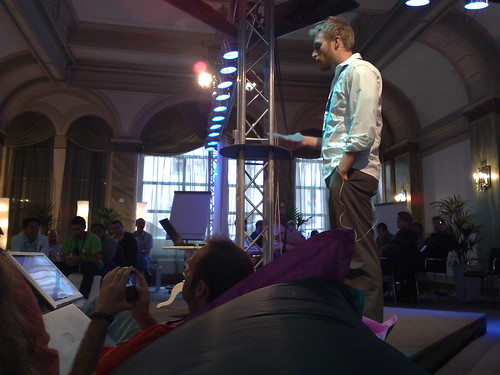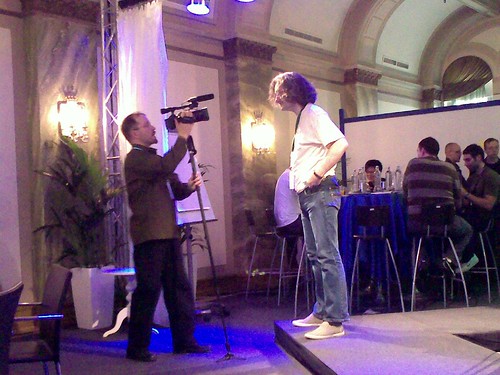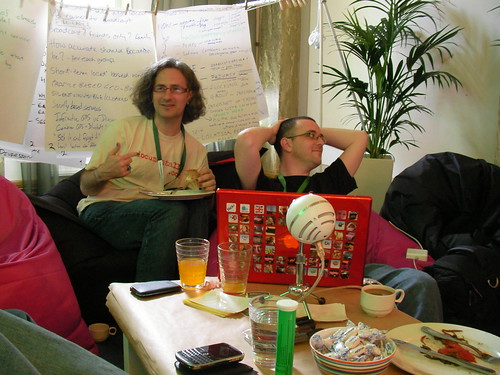 This morning I read a really excellent blog post by Ben Walker.
This morning I read a really excellent blog post by Ben Walker.
It’s headed Wake Up And Smell The Evidence and outlines via statistics gathered from Ben’s own audience just how little of this social media webby geeky stuff gets through to ‘your average music fan’.
So are we wasting our time? Not if, like me, you see David Jennings amazing book, Net Blogs And Rock ‘n’ Roll as the handbook to understanding this stuff.
 David addresses the very issue that Ben is most concerned with in the book, and in this blog post entitled Participation And Influence In Social Media in which he introduces us to a pyramid in which the 3 categories of participant in social media – as categorized by Bradley Horowitz – work as follows:
David addresses the very issue that Ben is most concerned with in the book, and in this blog post entitled Participation And Influence In Social Media in which he introduces us to a pyramid in which the 3 categories of participant in social media – as categorized by Bradley Horowitz – work as follows:
- Creators — 1% of the user population might start a group (or a thread within a group)
- Synthesisers — 10% of the user population might participate actively, and actually author content whether starting a thread or responding to a thread-in-progress
- Consumers — 100% of the user population benefits from the activities of the above groups (lurkers
So when we put all this stuff out there, when we make our blogs and music and widgets and all that geeky bollocks sharable, we’re actually doing it for only a small percentage of our audience.
We can actually take heart that 1% of our audience are likely to be creating their own widgets, writing their own blogs about music and generally making a fuss about the things they love. If that happens to be us or our music, so much the better.
The next 10% are the ones who care, who share and who are very often there to bring friends along to gigs – they aren’t doing youtube mash-ups of our songs and clips from US teen TV shows, but they are very much aware of what we’re up to, and are more than happy to pass the info along.
And at the base of the pyramid we have the other 89%, who just like what we do, who listen, who put it on while they do the dishes. Who buy CDs, who listen to the radio, and use the internet to write emails to relatives and to passively stalk old school friends on FriendsReunited. They don’t really care (at the moment) about downloading and RSS feeds and twitter and tagging and all that other stuff we’re so excited and passionate about.
But then they don’t need to. Hopefully they’ll find out about us because one of their 10 BFFs is doing that for them. and then maybe…
…1 of their 100 work colleagues has started his own internet radio station,
…and he digs mellow loopy solo bass post rock goodness.
…So he plays me.
…And then Mrs FriendsReunited hears it because, hey, he’s a nice bloke to work with, and he even went to the trouble of emailing the link round.
…Most of what he plays is very odd, but there was this really gentle bit in the middle, sounded like the soundtrack to a mellow film.
…etc. etc.
The evolution of web-tools will always be targeted at these three groups differently. While Ben and David and I are all trawling the net for news of great social apps that we can add as plug-ins to our wordpress blogs, our keen friends and fans are happy to click on the ‘share this’ links a the bottom of each blog, and send it out to their mates on facebook. The better the facebook integration with our blog is, the better the chances are for them to share that stuff. And given the size and reach of sites like facebook and myspace, you never know, Mrs FriendsReunited may well have a facebook page, and get sent a link to a post about my new album, and hear it, and think ‘hmm, that reminds me of that thing on the internet radio station’ and about 3 years later she’ll serendipitously find out that they were one and the same, and will buy a CD…
So please do read Ben’s post. It’s excellent. But the situation is slightly less bleak than he makes out, as the marvellous David Jennings makes so clear in his post. I’m glad I have such wise and talented friends. (and no, for the record, David didn’t steal the idea from me… 😉 )

 Weeks and weeks ago, I was ‘tagged’ by the very lovely and talented
Weeks and weeks ago, I was ‘tagged’ by the very lovely and talented  There’s been a whole load of talk in the last few days, following on from the financial crash, saying that ‘
There’s been a whole load of talk in the last few days, following on from the financial crash, saying that ‘ So, following up my thoughts about the ‘
So, following up my thoughts about the ‘ And the last session was Join and Collaborate – CT did a nice job of setting it up with his facilitator bit, but this was where the Nokia-ness of the session first impressed itself upon the kind of discussion we had.
And the last session was Join and Collaborate – CT did a nice job of setting it up with his facilitator bit, but this was where the Nokia-ness of the session first impressed itself upon the kind of discussion we had. Session 3 (session 2 for me) was the Entertainment one outlined in
Session 3 (session 2 for me) was the Entertainment one outlined in  So the format of the Friday was intro, followed by four sessions –
So the format of the Friday was intro, followed by four sessions – I’ve just spent 3 days geeking out in Helsinki, at the
I’ve just spent 3 days geeking out in Helsinki, at the